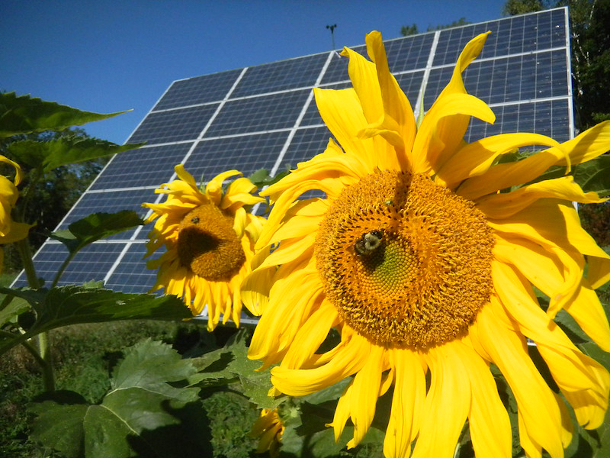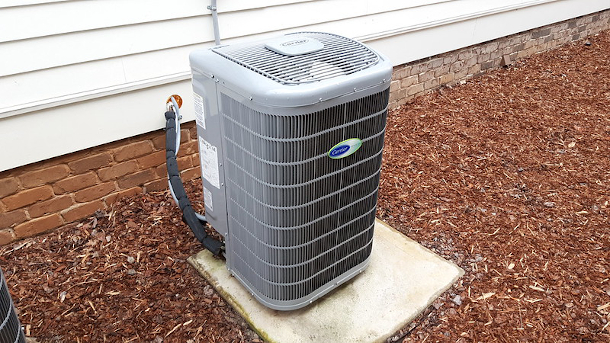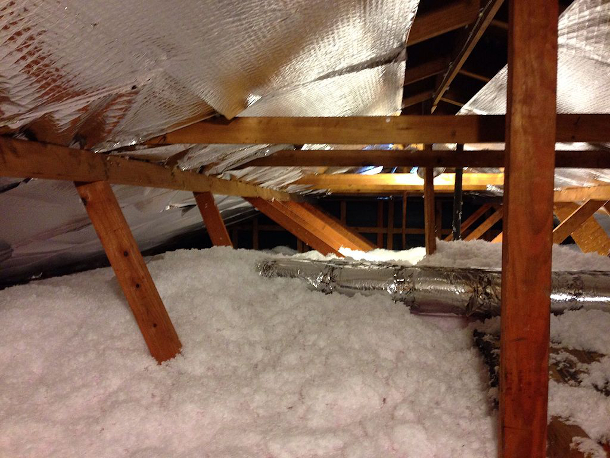Heat Pumps for Peace
Air Date: Week of March 18, 2022

Solar panels and sunflowers, the national flower of Ukraine. Solar energy is not highly concentrated in specific places the way that fossil fuels like oil, gas, and coal are, meaning that an autocrat cannot restrict the supply of renewable energy in the same way. (Photo: Sterling College, Flickr, CC BY-SA 2.0)
Amid the war in Ukraine, Europe has vowed to quickly wean itself off Russian gas. Climate activist and writer Bill McKibben joins Host Bobby Bascomb to explain his idea to invoke the Defense Production Act to rapidly manufacture electric heat pumps and send them to European homes as a way to permanently weaken Vladimir Putin’s oil and gas fueled war machine while fighting climate change.
Transcript
BASCOMB: From PRX and the Jennifer and Ted Stanley Studios at the University of Massachusetts Boston, this is Living on Earth. I’m Bobby Bascomb.
The horrors of Russia’s war in Ukraine are funded in large part by fossil fuels that it sells to the tune of half a billion dollars every day. Nearly half the federal budget for Russia comes from oil and gas revenue and the European Union is their biggest customer, roughly 40 percent of Europe’s gas supply is imported from Russia. But the EU recently unveiled a plan to cut Russian gas imports by two thirds this year and eliminate imports entirely by 2027. To help speed that phase out the Biden White House is reportedly considering a plan to use the Defense Production Act to rapidly manufacture and send electric heat pumps to European homes, many of which are currently heated by Russian gas. This idea to make heat pumps for peace was first raised by writer and activist Bill McKibben, who co-founded 350.org and Third Act. Bill McKibben joins me now from Vermont – welcome back to Living on Earth!
MCKIBBEN: Pleasure to be with you.
BASCOMB: So first remind us, what exactly is a heat pump?
MCKIBBEN: Well, a heat pump's actually very cool new technology. Cool, in particular, because it's closely related to the air conditioner. Think of it as an almost reversible air conditioner, made often by the same people. It takes ambient heat from the air, and uses that to heat the inside of your house, and does it pretty well, down to quite cold temperatures, because it turns out there remains some latent heat in the air even on a cold day. It's wonderful technology because it's able to produce heat with far, far less emissions than if you were running the gas furnace or the oil furnace in the basement. It runs off electricity, which means that the cleaner you get the grid, the cleaner the emissions result. And in the case of the current war in the Ukraine, it's particularly significant because deployed in sufficient number across Europe, it would rob Vladimir Putin of his longtime weapon, the threat to turn off the gas supply to Western Europe.
BASCOMB: Well, but as you mentioned, heat pumps do still have to be powered by electricity. So how effective are they at actually reducing emissions and dependence on that Russian oil if the bulk of that electricity is produced by burning Russian gas?

Heat pumps collect heat energy from outside a home and move it inside to heat the house, even during frigid temperatures. In the summertime most heat pumps can reverse the flow of energy to cool the home. (Photo: FANFAN61618, Flickr, CC BY-SA 2.0)
MCKIBBEN: Well, in the first place, they're more efficient than just burning gas in your furnace in the basement. So even if that's was all you were using, you'd still be better off. But in truth, what you really want, of course, is to connect them to a grid that gets steadily, steadily cleaner. That's what the EU has announced they're going to do, in the wake of the Ukraine invasion, they said they'd be running on renewables entirely by 2035. Obviously, this moment is a remarkable reminder of all the reasons why we should be quickly making that switch, not just in order to save the planet's climate, though that would certainly be nice. But also because Vladimir Putin, or anyone like him, can't embargo the sun, they can't put a stop to the wind. Look, fossil fuel is the fuel of choice for autocrats because it favors those people who happen to sit atop the few deposits of coal or gas or oil that are scattered around the planet. All of us are lit by the sun and washed by the wind. So in a world that runs off renewable energy, no one gets unearned power simply because of where they happen to be sitting.
BASCOMB: Well, why push for heat pumps then and not say, expanded rooftop solar, for instance?
MCKIBBEN: That works too, go to work on any of these things. In fact, some of the things are super easy. There's a lot of spare capacity in the US, apparently, for producing insulation right now. And anybody who's spent time say, in a British house knows that insulation was not a big feature of a lot of the housing stock. So let's get bundles of that across the ocean as fast as we can. The point is that if we're able to make use, say, of the Defense Production Act, which every president since the Korean War has used, and which both Trump and Biden used to speed up vaccine production, then we can take advantage of this spare capacity and get some of this stuff over to Europe before next October, when I would predict it's going to start getting cold again. So let's get on it, sooner rather than later.
BASCOMB: Tell us a bit more about the Defense Production Act as a tool to quickly ramp up production of heat pumps in this case, how easy is it for the President to invoke the DPA, and maybe give us a couple of relevant examples of when it's been used?
MCKIBBEN: Well, they've done it repeatedly, 50 times since Korea, and most recently, as I said, to speed up vaccine production. But also, Joe Biden invoked it because after last summer's record wildfires in the West, we were running out of fire hose. So the DPA, the Defense Production Act was invoked in order to get a factory in Oklahoma churning out mile upon mile of fire hose in the time that was needed. Really, what we're talking about here, is going back to what the US did before the Second World War. You'll recall that before Pearl Harbor was bombed, but while the war in Europe had begun to rage, the US did something called Lend-Lease, where they sent vast quantities of material, food and other supplies, across the Atlantic in ships. And that really was crucial to sustaining the British for a year or two until Pearl Harbor and America entering the war. That's what we should be doing again, on that scale.

A group of smiling children sit at a table and eat cheese imported from America as part of the Lend-Lease program in 1941 in the playground of a severely bomb-damaged school. (Photo: Ministry of Information Photo Division Photographer / UK Gov’t, public domain)
BASCOMB: That sounds like a lot of job creation as well.
MCKIBBEN: Yeah, a lot of job creation and jobs that people right now would be eager to do, because all of us are looking for ways to try and figure out how to stand with the very brave people in the Ukraine.
BASCOMB: Well, how quickly can manufacturers ramp up production of heat pumps on the massive scale that would be needed to quickly phase Europe off of gas?
MCKIBBEN: Well, the people that I've talked to in the federal government think that it can happen pretty fast, that there's spare capacity at the big air conditioner manufacturers, companies like Carrier or Trane that would allow them to start pretty quickly putting this stuff into operation. And that talking about the course of the next six months for getting a lot of these installed is not crazy. But again: heat pumps, insulation, whatever we can think of that help reduce the power of Vladimir Putin's energy weapon. We were fools to let that weapon stay in place as long as it has, Western Europe was complacent. And of course, the usual combination of inertia and toxic vested interest was enough to ensure that he had the playing field he wanted. We should take that away from him.
BASCOMB: Well, Bill, you know, this sounds like a great idea. But I have to say, I looked into getting heat pumps in my house here in New Hampshire a couple years ago, we put up solar panels at the time and considered heat pumps to go along with them. But it was basically going to double the cost of our solar installation. What kinds of policies can be put in place to help bring down those costs, so they're more affordable for many Americans?
MCKIBBEN: Well, first of all, this is precisely, you know, one of the advantages of getting the government involved quickly in doing this. Once you start building things en masse, you get better at it, and they get cheaper, and more and more people know how to install them. And that's already happening. You know, we have them installed here in our house, and they work great. And the local contractors are increasingly conversant with the technology. But that needs, as you say, to spread out fast. Because, war in the Ukraine aside, we're going to need to deploy technologies like this at scale before to have any chance of meeting the targets that the climate scientists have set for us. There's no way that we're going to do what the IPCC has asked and cut emissions in half by 2030 if everybody's still got a gas furnace blazing away in the basement.
BASCOMB: Well, heat pumps are basically air conditioning systems in reverse, as you mentioned earlier, so they provide heat in the winter, and they cool homes in the summer. Around 5% of European homes currently have air conditioning. So to what extent can heat pumps, you know, have the added benefit of helping Europe prepare for the extreme heat waves that are going to be coming with climate change?

Weatherizing homes so that they leak less heat in the winter can help reduce the amount of energy needed to heat them. For example, if the home is heated with a gas boiler, better insulation means less gas will be needed to heat the house. (Photo: Jason Dale, Wikimedia Commons, CC BY-SA 3.0)
MCKIBBEN: Yeah, I mean, this is a very significant point. It's not just Europe, either. I mean, the demand for air conditioning is going to grow exponentially as this century goes on. And it's going to grow most in the hottest and poorest places. Countries like India are forecast a huge growth in air conditioner usage, because the prospect of massive heat waves across the subcontinent are enormous. We need to be able to provide that comfort as efficiently as possible. If we're just tossing old-fashioned air conditioners on buildings then the load on the electric grid is going to be enormous. It'll cancel out whatever we're doing in terms of building out renewables. So efficient, good technology like this is desperately needed around the world.
BASCOMB: Well, what kind of reactions are you getting from the Biden administration about this idea?
MCKIBBEN: From what I can tell, and from what reporters at places like The Washington Post and the Los Angeles Times have been writing, they seem interested. I mean, look, there's obviously a million things going on right now for them to deal with. And right at the moment, I'm sure they're more focused on figuring out how to get anti-tank missiles into Ukraine than they are about how to get heat pumps into Britain or Germany or France. But I think that people are starting to realize that those are the same tasks, that these are both ways to weaken this war machine that Vladimir Putin is rolling out across Central Europe. So it wouldn't surprise me if we see more and more focus on this kind of stuff going forward.
BASCOMB: Of course, there is a competing push from many in Congress to ramp up domestic oil and gas production in response to the high prices at the pump here. Do you have any sense of the traction that's receiving?
MCKIBBEN: Well, it's always going to receive traction because the fossil fuel industry owns one of our two political parties, and has, you know, intimidated the other one. And so, you know, you see even climate stalwarts like John Kerry in the last week or two reverting to "all of the above" energy language. That's why this is such an important moment. If we just use it to decide to double down on the status quo, then we will have missed an extraordinary opportunity to help Ukraine, to help the climate, to help our economy, to help the future. The fossil fuel industry obviously wants to delay the inevitable transition as long as they can. At this point, they're doing it at the cost of the physical planet, but they're also doing it at the cost of everybody intimidated by an autocrat around the world.

Bill McKibben is founder of Third Act and 350.org and the author of books including The End of Nature, the first mainstream book on global warming, published in 1989. (Photo: © Nancie Battaglia)
BASCOMB: You know, it does sort of feel like we're at a crossroads here, which route are we going to take? I mean, you know, in the response to the energy crisis in the 1970s, we traded in those heavy gas guzzlers for lighter, more fuel efficient cars. It seems like we have maybe a similar opportunity here to make a better choice.
MCKIBBEN: That's right, and to make a bunch of choices that, you know, I spent part of last week writing an op-ed with a colleague of mine in Ukraine, Svitlana Romanko. And what we were talking about was another choice that Americans can make, which is to stop doing business with the banks that have been both funding Putin and funding the fossil fuel industry. Third Act, this new but rapidly growing group that we've recently founded to organize people over the age of 60 around climate questions, has this pledge from people to stop doing business with these banks, and it's taken off like gangbusters because people can see the linkages. We're out of second chances, you know, we've wasted -- I wrote the first book about climate change 33 years ago. None of this is a huge surprise to anybody. We've known what's coming, we just haven't acted. So now we better.
BASCOMB: Bill McKibben is an author and activist who co founded 350.org. Bill, thank you so much for taking this time with me today.
MCKIBBEN: Well, I've really enjoyed it. Thank you.
Links
Read Bill McKibben’s Substack article, “Heat Pumps for Peace and Freedom”
The Washington Post | “Heat pumps can counter Putin and the climate crisis, advocates say”
Living on Earth wants to hear from you!
Living on Earth
62 Calef Highway, Suite 212
Lee, NH 03861
Telephone: 617-287-4121
E-mail: comments@loe.org
Newsletter [Click here]
Donate to Living on Earth!
Living on Earth is an independent media program and relies entirely on contributions from listeners and institutions supporting public service. Please donate now to preserve an independent environmental voice.
NewsletterLiving on Earth offers a weekly delivery of the show's rundown to your mailbox. Sign up for our newsletter today!
 Sailors For The Sea: Be the change you want to sea.
Sailors For The Sea: Be the change you want to sea.
 The Grantham Foundation for the Protection of the Environment: Committed to protecting and improving the health of the global environment.
The Grantham Foundation for the Protection of the Environment: Committed to protecting and improving the health of the global environment.
 Contribute to Living on Earth and receive, as our gift to you, an archival print of one of Mark Seth Lender's extraordinary wildlife photographs. Follow the link to see Mark's current collection of photographs.
Contribute to Living on Earth and receive, as our gift to you, an archival print of one of Mark Seth Lender's extraordinary wildlife photographs. Follow the link to see Mark's current collection of photographs.
 Buy a signed copy of Mark Seth Lender's book Smeagull the Seagull & support Living on Earth
Buy a signed copy of Mark Seth Lender's book Smeagull the Seagull & support Living on Earth

